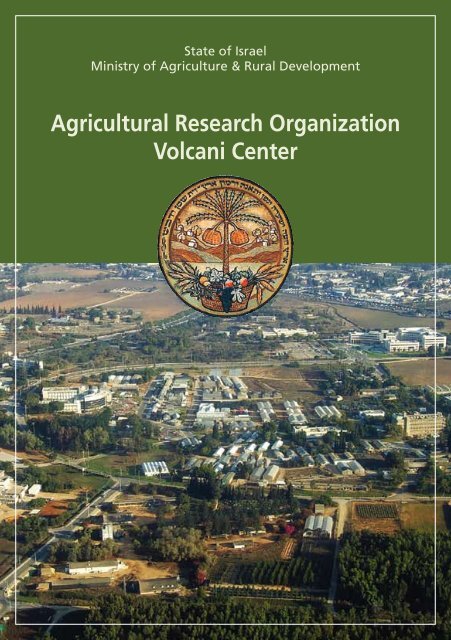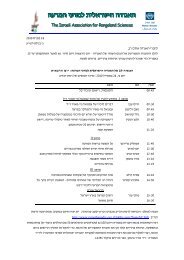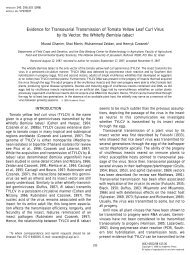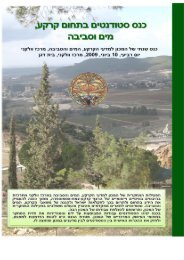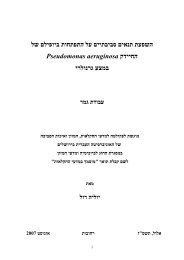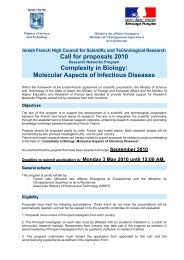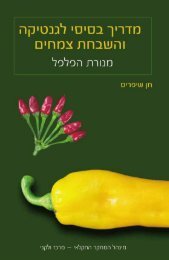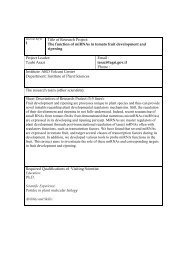Agricultural Research Organization Volcani Center
Agricultural Research Organization Volcani Center
Agricultural Research Organization Volcani Center
- No tags were found...
You also want an ePaper? Increase the reach of your titles
YUMPU automatically turns print PDFs into web optimized ePapers that Google loves.
<strong>Agricultural</strong> <strong>Research</strong><strong>Organization</strong> - <strong>Volcani</strong> <strong>Center</strong>The <strong>Agricultural</strong> <strong>Research</strong> <strong>Organization</strong> (A.R.O.) is the centralgovernmental research institute for agriculture in Israel.The center is named after its founder, Dr. Yitzhak Elazari-<strong>Volcani</strong>, whoin 1921 established the <strong>Agricultural</strong> Experiment Station in Ben-Shemenand in Tel-Aviv. In later years it became the ARO-<strong>Volcani</strong> <strong>Center</strong>. ARO isamong the best-known agricultural research centers in the world, with aninfrastructure that supports both basic and applied research in agriculturaland environmental sciences.Personnel at ARO include approximately 200 PhD scientists, 340 engineersand technicians, and 220 graduate students. ARO consists of six researchinstitutes located at the main campus near Rishon LeZion and two regionalresearch centers: 'Newe Yaar' in the north and 'Gilat' in the south. Theinstitutes are: Plant Sciences; Animal Science; Plant Protection; Soil,Water and Environmental Sciences; Postharvest and Food Sciences; and<strong>Agricultural</strong> Engineering.Most of the information developed at ARO is available to the public at large,while some is commercialized through ARO’s 'Kidum' R&D Applicationsunit. Beneficiaries of the achievements of ARO include farmers, agriculturalindustries, and above all—Israeli consumers, who enjoy a variety of highquality agricultural products grown under environmentally-sustainableconditions.
Institute of Plant SciencesThe Institute of Plant Sciences is the largest of the six institutesin ARO. Its main goal is to develop and put into practiceknowledge relevant for agricultural plants and management of openareas. The Institute consists of four departments: Field Crops and NaturalResources, Ornamentals, Vegetable Crops, and Fruit Trees. In addition, theIsrael Plant Gene Bank (IGB) is an integral part of the Institute. The Bank isdedicated to collection, preservation, maintenance and characterization oflocal seeds and plants that are wild relatives of agricultural plants.<strong>Research</strong> in the Institute combines both basic and applied knowledge forthe advancement of production of grains, fruits, vegetables, ornamentalsand specialty crops. Scientists at the Institute develop new agriculturalcommodities using genetics, agro-technology, physiology, molecularbiology, and biotechnology.Among the leading research areas of the Institute are:• Breeding and improvement of fruit and vegetable crops includingnew techniques to accelerate breeding programs• Introduction and acclimation of new crops such as vegetables, herbs,medicinal and ornamental plants• Understanding processes of rooting and propagation in ornamentalplants and fruit trees• Development of methods to produce out-of-season fruits andvegetables, and improved pollination and fruit set• Development of plants for use as biodiesel fuel• Development and management of forests and open areas, breedingforest trees and improving the productivity of grazing lands• Identification of genes involved in determining the size and shape offruits, regulation of flowering, stability of pigments in flower petals,and various aspects of fruit quality
Institute of Plant ProtectionThe Institute of Plant Protection consists of twodepartments: Entomology, Nematology and Chemistry,and Plant Pathology and Weed <strong>Research</strong>.<strong>Research</strong> at the Institute is focused on identification and characterizationof insects, nematodes, fungi, bacteria, viruses, phytoplasmas and weedsknown to cause damage to agricultural produce. Scientists at the institutedevelop environmentally friendly methods for efficient control of pests.These include bio-pesticides, physical treatments, breeding resistantplants, and integrated pest management. The aim of this research is toproduce agricultural goods that are free of both chemical residues anddisease-causing organisms. In addition, researchers at the Institute developexpert systems for decision-making to maximize the effectiveness of plantprotection methods.Examples of research at the Institute:• Identification and characterization of pests and sources of disease inplants; research on the mode of pathogenicity of bacteria, viruses andfungi; and population dynamics of plant pests• Precision control of weeds• Breeding pest-resistant plants• Development and application of methods for biological control ofpests, especially for organic farming• Development of decision-making systems for effective pesticideapplication with reduced chemical use• Isolation, identification and application of pheromones for control ofinsect pests• Physiology, genetics and biochemistry of insects and nematodes• Production of propagation material that is free of disease-causingorganisms• Development of means of controlling water-borne diseases inirrigation systems and in recycled water• Use of viruses as vectors for expressing foreign genes in plants
Institute of Soil, Water andEnvironmental SciencesThe Institute of Soil, Water and Environmental Sciences consists oftwo departments: Environmental Physics and Irrigation, and Soil Chemistryand Microbiology.<strong>Research</strong> activity at the Institute is focused on the interaction betweensoil, plants, and the atmosphere and on optimizing the responsible useof soil and water resources in Israel. The goal of the research is to developproductive sustainable agriculture, while protecting the environment bylimiting soil and water pollution.Among the research projects in the Institute:• Developing efficient and environmentally-friendly methods ofirrigation, fertilization, climate control and cultivation in open fields,screenhouses, and greenhouses• Developing physical models for quantification and prediction ofwater and solute movement from the soil surface to undergroundwater reserves to enable optimization of irrigation regimes and forevaluation of the danger of soil and water contamination by variouspollutants• Safe and effective agricultural use of fresh, gray, brackish, flood, anddesalinated water as well as organic waste• Determining the availability of nutritional elements in water andwaste liquids• Investigating the effect of using the above resources on soil stability,microbial activity, absorption and movement of soil contaminants• Developing advanced methods for soil improvement: additives formitigating evaporation, salinization, sodification, runoff, erosion, andsoil structure deterioration, both in rain-fed and irrigated farming
Institute of Postharvestand Food SciencesThe Institute of Postharvest and Food Sciences consists oftwo departments: Postharvest Science of Fresh Produceand Food Quality and Safety. The main research topics ofthe Institute involve the quality, security and healthinessof fresh and processed animal and plant products, both for export and forlocal consumption. Basic and applied research projects combine to developand expand the markets for Israeli agricultural products, while ensuringboth consumer health and farmer income.Prominent research areas of the Institute include:• Extending the storability and shelf-life of fresh harvested agricultural produce• Extending the shelf life of fresh-cut and processed plant and animal products• Developing controlled atmosphere protocols to delay ripening, senescenceand rotting in fresh produce and to control pests in stored grains• Alternate methods for chemical control of pathogens• Enhancing vase life and quality of cut flowers, ornamental branches,pot plants and propagation material• Improving sensory attributes and nutritional levels of fresh produce.• Improving the safety of fresh, fresh-cut and processed plant andanimal products• Improving the quality of milk and dairy products• Methods to prevent fungal infestation and mycotoxin contaminationin fresh and dried produce• New technologies in silage production
Institute of <strong>Agricultural</strong>EngineeringThe Institute of <strong>Agricultural</strong> Engineering is the only researchorganization in Israel whose activities encompass a wide range ofengineering and technological topics relating to all aspects of agriculture.The institute consists of two departments: Sensing, Information, andMechanization Engineering; and Growing, Production and environmentalEngineering. The main objective of the Institute is the development ofadvanced engineering technologies that improve production for the benefitof growers, consumers and the environment. The diverse research projectsat the Institute are the foundation for the application of new technologiesto the Israeli and world agriculture.Among the projects of the Institute are:• Robotics, mechanization and automation of processes aimed to reducethe amount of manual labor in growing, harvesting, and post harvestprocedures• Developing sensors for sorting fresh produce according to size, qualityand other properties• Improving the structure of agricultural buildings such as greenhousesand animal houses• Climate control in greenhouses, animal houses and barns• Development of innovative specialized spray technologies• Optimization of management and decision making procedures• Quality management, assurance, and production engineering• Remote sensing and GIS for precision agriculture
Gilat <strong>Research</strong> <strong>Center</strong>The Gilat <strong>Research</strong> <strong>Center</strong> is the southern branch ofthe <strong>Agricultural</strong> <strong>Research</strong> <strong>Organization</strong>. It is locatedin the northwestern Negev region on loess soil.Gilat is a leading research center for developingmethods of agricultural production that are appropriate for arid and semiaridregions such as the Negev and Arava.The main research topics include:• Field crops: Improving sustainability and productivity of rainfed fieldcrops, wheat quality, precision agriculture utilizing remote sensing,prediction of nitrogen and phosphorus availability in the soil.• Rangelands: Natural resources, desertification, planted pasture forgrazing in arid areas.• Tree crops: Fruit trees cultivation in semi-arid conditions with focus oncitrus, olives including olive oil quality, guava apricot, pollination andbee forage, Vegetable crop physiology under stress conditions.• Plant protection: Biological pest control, pest resistance to pesticides,environmentally friendly pesticides, control of nematodes inconventional and organic agriculture, Epidemiology and control ofsoil- and potato seed-borne pathogens, Plant disease diagnostics.• Soil and water: Managing water in the arid zones, utilization of saline,treated and recycled waste water for irrigation; Mineral nutrition ofvegetables and herbs in greenhouses and of olives.
Newe Yaar <strong>Research</strong> <strong>Center</strong>The Newe Yaar <strong>Research</strong> <strong>Center</strong> is the northern branch of theAgricutural <strong>Research</strong> <strong>Organization</strong>. <strong>Research</strong> at the center isinterdisciplinary, with main efforts focused on cucurbits, herbs,weeds and beef cattle.Prominent research activities at Newe Yaar include:• Cucurbits: Breeding of new cultivars, with an emphasis on naturalpest resistance and on improvement of fruit quality.• Herbs: Introduction, breeding, agrotechnology and physiology ofculinary, medicinal and aromatic herbs. Chemistry and biologicalmode of action of natural products.• Weeds: Developing biological methods of weed control anderadication, including integrated management and precision methodsfor conventional and organic agriculture.• Beef cattle: Breeding for efficient production; interaction of animalbehavior and energy balance with pasture location for improvedgrazing and production efficiency; effect of stress on cattle health.• Pomology: Acclimatization and breeding of deciduous fruit varieties;preservation of ancient fruit varieties and wild relatives for futurebreeding; identification of genetic markers for desirable traits.• Environment: Recycling waste from olive presses and its use inagriculture; characterization and neutralization of noxious odor inmanure, sewage and sludge; compost based on organic waste.• Entomology: Developing and applying environment-friendlymanagement regimes for controlling arthropod pests in agricultureby the use of parasitoids and predatory mites and the manipulationsof symbiotic bacteria
"KIDUM" UnitThe <strong>Agricultural</strong> <strong>Research</strong> <strong>Organization</strong> (ARO) has provenaccomplishments in the development of innovative productsand technologies, including items of interest to industry inIsrael and abroad.The interaction of ARO with commercial entities is conducted bythe Kidum unit which deals with the following topics:• Identifying research projects with the potential for commercialization,and presenting business opportunities to commercial organizations• Economic and business consulting together with testing and evaluationaimed to set expectations for the success of the project• Evaluating possibilities for research collaboration with commercialcompanies and /or funding of projects by business entities• Negotiation, preparation and signing of agreements for joint projectsbetween the ARO and commercial companies• Protection of intellectual property rights derived from developmentsof ARO researchers, by registering patents and plant breeder’s rightson behalf of ARO and the State of Israel all over the world• Granting of licenses for the use of varieties and other technologiesdeveloped at AROThe ARO has to its credit more than 350 registered plant varieties,180patent families and more than 400 commercial agreements with corporatecustomers in Israel and abroad. Kidum operates to disseminate the scientificknowledge developed at ARO and to turn it into practical applications inagriculture and industry, while maintaining the intellectual property rightsof ARO and the State of Israel.Contact with Kidum:Phone: 972-3-9683298Fax: 972-3-9604835kidum@volcani.agri.gov.il
<strong>Agricultural</strong> <strong>Research</strong> <strong>Organization</strong> - <strong>Volcani</strong> <strong>Center</strong>Head officeTel: 972-3-9683226Fax: 972-3-9685327E-mail: hvered@volcani.agri.gov.ilSpokesperson's officeTel: 972-3-9683215Fax: 972-3-9683292E-mail: Spokesperson@volcani.agri.gov.ilThe Joshuah Wax Unit for Science Oriented Youth<strong>Volcani</strong> <strong>Center</strong>Tel: 972-3-9683775Fax: 972-3-9683696E-mail:noshem@agri.gov.ilP.O. Box 6 Bet-Dagan 50250, Israelwww.agri.gov.ildesign: milli & rachel 09-7666370


